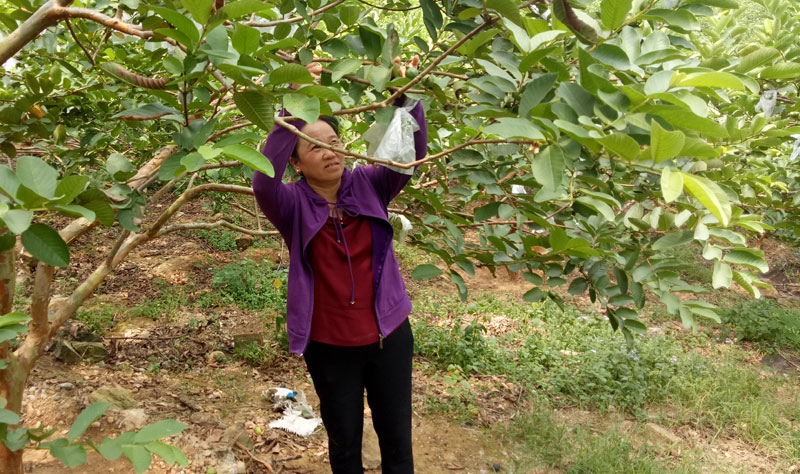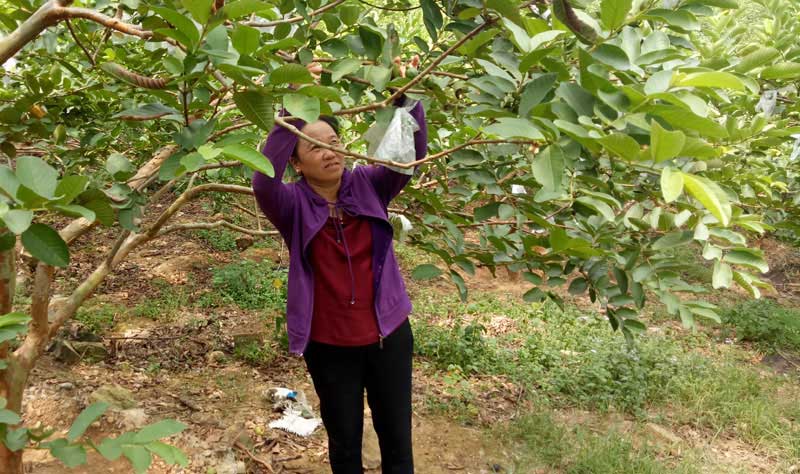
(HBO) In recent years, Yen Mong guava (Hoa Binh city) is famous for its delicious quality, crispy, sweet, natural ripping and not using stimulants. The area of guava cultivation in the commune is more than 5 ha with 5 households, concentrated in Bac Yen, Moi Mit and Bun helmets. Taiwanese Pear-Guava trees have been grown there. Le Thi Hue's household in Bac Yen village has planted the most with an area of over 3 ha.

Mrs. Le Thi Hue, Bac Yen village is taking
care of the family’s guava garden.
Bringing us to visit the guava garden, Mr.
Dinh Chi Duyen in Moi Mit helmet said: "My family has a garden land of 7000
square meter. At first, we had the intention to grow citrus fruit trees, but we
needed a large amount of money. Thus, we
decided to plant guava trees. I myself brought the soil and water samples to
the State Breeding Institute to meet the consultants. They told me that the
soil and land in there can be suitable with a variety of plants, including the
guava trees. As a result of this, we decided to buy the seeding from the
Institute for the investment to grow guava. My family planted guava trees in
2015, initially 250 pear-guava trees from Taiwan. They were harvested at the
end of 2016 and since 2017 they have been harvested for the stable revenue of
more than 1 ton with the price of 25,000 VND/kg.
According to Mr. Duyen, the process of caring
for guava is not too difficult. When being planted, seedlings need appropriate
fertilizer. When the guava fruits are as big as forefoot, they must be covered
with two layers of nylon and sponge to avoid yellowing and suntan. The guava
fruits are sealed in the wrap until they mature for harvest during a period of
more than two months
Thus, it takes about 100 days from the fruit
blooming, wrapping the plastic to harvest. However, guava fruits are all year
round, so they can be harvested weekly. Therefore, guava trees can bring high
economic efficiency to many households in Yen Mong. It is remarkable that the
guava growers of in the area have been trained and they are capable of intensive
farming. 100% of farmers apply the caring procedures using bio-products and
organic fertilizer mixed with lime to ensure the food safety and non-
environmental pollution. Especially, the trading area of guava, people often
use nylon bags to prevent insect pests, hoarfrost, yellow fly. They also use
plant protection products to increase productivity by about 20%. At the same
time the price of guava covered products has also increased 2-3 times compared
with non-covered ones.
According to data from the Hoa Binh Provincial Party Committee, the industrial production index for the first six months of 2025 is estimated to have increased by 20% compared to the same period last year. This marks the highest year-on-year growth rate for this period since 2020.
In the first six months of 2025, Hoa Binh province’s export turnover was estimated at 1.145 billion USD, marking an 18.11% increase compared to the same period in 2024. Import turnover was estimated at $ 804 million, a 17.15% increase, which helped the province maintain a positive trade balance.
The lives of the ethnic minority farmers in Tan Lac district have gradually improved thanks to the new directions in agricultural production. This is a testament to the collective strength fostered through the professional associations and groups implemented by various levels of the district’s Farmers’ Union.
With the motto the "product quality comes first,” after nearly one year of establishment and operation, Muong village’s Clean Food Agricultural and Commercial Cooperative, located in Cau Hamlet, Hung Son Commune (Kim Boi district), has launched reputable, high-quality agricultural products to the market that are well-received by consumers. The products such as Muong village’s pork sausage, salt-cured chicken, and salt-cured pork hocks have gradually carved out a place in the market and they are on the path to obtaining the OCOP certification.
In the past, the phrase "bumper harvest, rock-bottom prices" was a familiar refrain for Vietnamese farmers engaged in fragmented, small-scale agriculture. But today, a new spirit is emerging across rural areas of Hoa Binh province - one of collaboration, organisation, and collective economic models that provide a stable foundation for production.
Maintaining growing area codes and packing facility codes in accordance with regulations is a mandatory requirement for agricultural products to be eligible for export. Recently, the Department of Agriculture and Environment of Hoa Binh province has intensified technical supervision of designated farming areas and packing facilities to safeguard the "green passport" that enables its products to access international markets.



